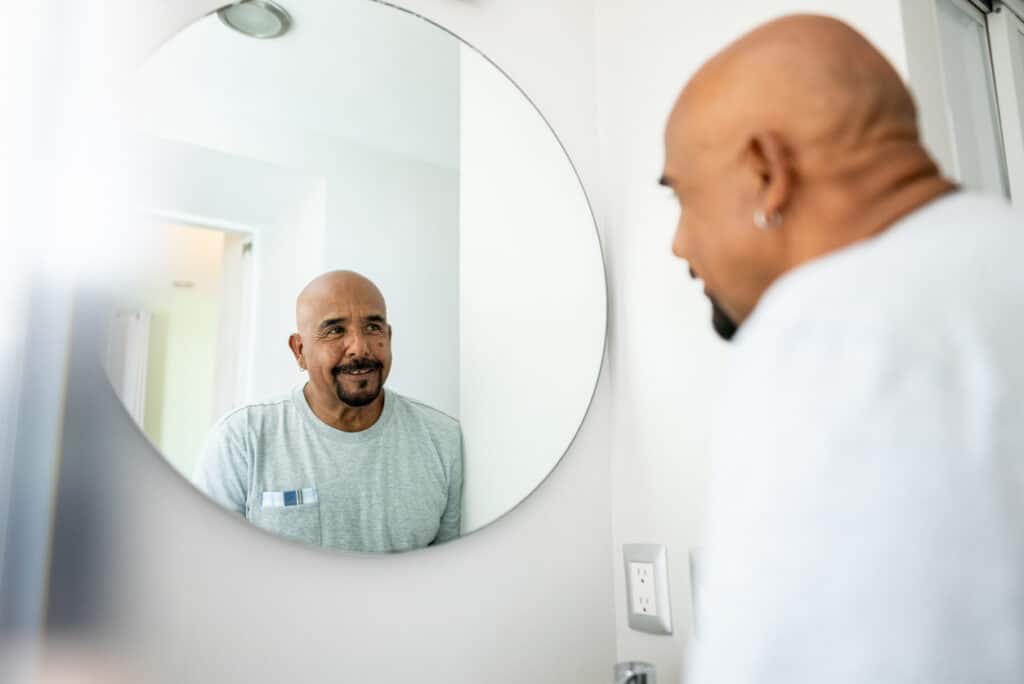Forgiveness is a powerful act. If you’ve ever been forgiven for something you did that hurt someone, you know just how effective forgiveness can be. If someone has deeply hurt you, you also know how hard it can be to extend forgiveness. But sometimes, the toughest act of forgiveness is learning how to forgive yourself.
Self-forgiveness is essential for healing and moving forward in recovery. It allows you to release the guilt and shame that can hold you back and embrace a healthier, more positive mindset. In this post, we’ll define self-forgiveness in recovery and share tips and activities to help you practice it.
What is Self-Forgiveness in Recovery?

Self-forgiveness in recovery is the process of letting go of guilt, shame, and self-blame for past actions, and allowing yourself to heal and move forward.
It’s not about excusing harmful behaviors or forgetting the impact they had on others. Instead, it’s about acknowledging your past, understanding that you are more than your mistakes, and allowing yourself the grace to start fresh.
Why Self-Forgiveness in Recovery is Important
Self-forgiveness is a crucial part of recovery because it helps you break free from the cycle of guilt and shame that can keep you stuck. Holding onto past mistakes and blaming yourself can make it harder to move forward, build healthy habits, and fully embrace your recovery.
Without self-forgiveness, you’re more likely to fall back into old patterns of self-doubt, which can increase the risk of relapse. Shame will not get you out of that cycle; in fact, it will keep you in by making you feel bad about yourself and convincing you that overcoming your addiction is impossible.
How to Start Practicing Self-Forgiveness in Recovery

Learning to forgive yourself is an essential part of the recovery process, but it can feel difficult at first. Following these steps can help you begin practicing self-forgiveness in a meaningful way:
1. Acknowledge Your Past Mistakes
The first step in self-forgiveness is accepting responsibility for your actions without hiding from or denying them. Acknowledging what you’ve done and how your addiction impacted your loved ones can be uncomfortable, but it’s an important part of healing. There’s no need to beat yourself up, but it’s important to be honest with yourself so you can move forward.
2. Understand That You Are Not Your Mistakes
Your mistakes don’t define you. In recovery, it’s important to separate your identity from the actions you’re working to change. Understanding that your past doesn’t determine your future is key to letting go of self-blame.
3. Practice Self-Compassion
Forgiving yourself starts with being kind to yourself. Self-compassion involves treating yourself with the same care and understanding that you’d offer someone else. Instead of focusing on how you’ve failed, recognize that you’re doing the best you can to make things right.
4. Seek Professional Help
Sometimes, practicing self-forgiveness can feel too overwhelming to handle alone. Therapy or support groups can offer guidance and perspective on how to let go of guilt and shame in healthy ways. A therapist can also help you work through any unresolved emotions that are blocking your ability to forgive yourself.
5. Make Amends Where Possible
Taking action to make things right, when possible, is a powerful way to support your process of self-forgiveness. Making amends doesn’t mean you can undo the past, but it shows you’re committed to changing your behavior and repairing relationships that were affected by your addiction.
Activities to Practice Self-Forgiveness in Recovery

Now that we know how crucial forgiving yourself is in recovery, how do we go about practicing it? Here are some activities to help you practice self-forgiveness and move forward in your recovery journey.
1. Journaling Your Feelings
Writing in a journal is a great way to process your emotions and reflect on your recovery. It gives you space to think through past actions, understand your feelings, and track your progress over time. Journaling can also help you separate who you are from what you’ve done, allowing you to see your growth without holding onto guilt.
Steps:
1. Set aside 15-20 minutes each day to write.
2. Write about a past mistake that weighs on you and how it made you feel.
3. Reflect on how your actions affected others and how you’ve grown since then.
4. End your entry by reminding yourself that you are more than your mistakes, and growth is part of the process.
2. Affirmations for Self-Compassion
Using affirmations is a powerful tool for shifting your mindset. By regularly speaking kind words to yourself, you replace self-criticism with compassion. This practice helps you internalize the idea that you deserve forgiveness and healing, and it can boost your confidence as you navigate recovery.
Steps:
1. Stand in front of a mirror each morning.
2. Take a few deep breaths to center yourself.
3. Repeat affirmations like:
- “I am worthy of forgiveness.”
- “I am doing the best I can.”
- “I am learning and growing each day.”
4. Say these with conviction and really let them sink in.
5. Repeat them throughout the day when negative thoughts start to creep in.
3. Mindfulness and Meditation

Mindfulness and meditation are excellent ways to develop a non-judgmental attitude toward yourself. These practices help you stay grounded in the present moment and reduce the power of negative thoughts. They can also help you gain more self-awareness and self-compassion as you learn to let go of past mistakes.
Steps:
1. Set aside 10-15 minutes each day for meditation or mindfulness practice.
2. Find a quiet space where you won’t be disturbed.
3. Close your eyes and focus on your breathing.
4. If negative thoughts arise, acknowledge them gently and return your focus to your breath.
5. Stay in the present moment, releasing any judgment or guilt from the past.
4. Creating an Amends List
Making amends is about taking responsibility for your past actions and working to heal relationships. Creating an amends list is a great way to think through the people you’ve hurt and decide how to take responsibility, even if it’s just through a heartfelt apology. This can be a powerful step toward self-forgiveness.
Steps:
1. Take a few minutes to list people you’ve hurt or let down.
2. Next to each name, write down the actions that caused harm and how they might have been affected.
3. Think about how you can make amends—this could be an apology or simply offering support where possible.
4. Start with the people you feel ready to reach out to, and create a plan for how to approach them.
5. Celebrate Your Progress
It’s easy to focus on what you haven’t done yet, but celebrating small milestones in recovery helps you shift focus to what you’ve already achieved. Recognizing progress encourages you to keep going and reinforces that recovery is about progress, not perfection.
Steps:
1. Set aside time each week to reflect on your achievements, no matter how small.
2. Write down at least three things you’ve accomplished that week.
3. Take a moment to acknowledge and celebrate these wins—whether it’s staying sober for a week, practicing new coping skills, or handling a tough situation without turning to substances.
4. Share your progress with a supportive friend or family member to reinforce the positive changes.
6. Creating a Forgiveness Ritual
Creating a ritual for self-forgiveness can be a powerful way to let go of guilt and embrace healing. This symbolic act helps you release the emotional weight of past mistakes and take a step toward peace and closure.
Steps:
1. Take a moment to reflect on the release and the peace you feel afterward.
2. Choose a quiet, private time to do this ritual, free from distractions.
3. Write down the things you need to forgive yourself for on a piece of paper.
4. Reflect on each item briefly, acknowledging its impact but not judging yourself.
5. Once ready, read the paper aloud, then safely burn or tear it up as a symbolic gesture of letting go.
6. As you do this, say aloud, “I forgive myself, and I choose to move forward.”
Find Support for Lasting Recovery
Self-forgiveness is a key part of your recovery journey. It takes time, but with the right support, it’s possible to heal and move forward. At The Meadows, we’re here to guide you every step of the way towards lasting recovery.
If you or someone you love could use some support in their recovery, or if you have questions or are considering taking that first step, we’re here to help.
Contact us today to learn more about addiction recovery treatment programs.



